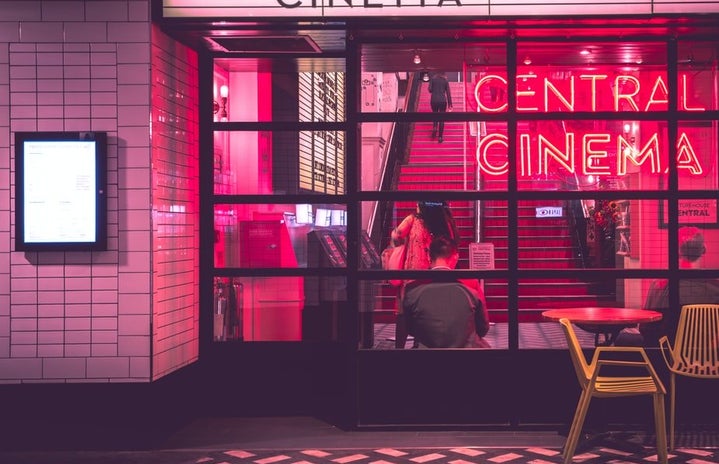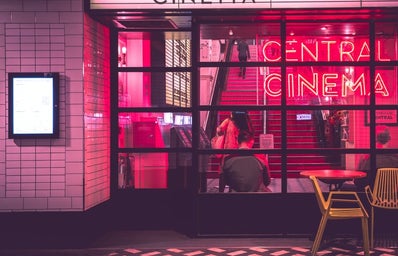Between on-set romances and rumoured feuds between co-stars, the early dismissal of Shea Lebouf, and accusations that Harry Styles spat on Chris Pine at the Venice Film Festival – it’s fair to say that the Don’t Worry Darling drama provided as much entertainment as the film itself. What’s more, according to the overwhelmingly negative reviews, this drama followed a significantly higher crafted storyline. However, even before its chaotic press tour, film buffs had DWD earmarked as one of the most promising psychological thrillers of the year. While this, of course, can partly be accredited to its indulgently star-studded cast, it is largely thanks to the success of Olivia Wilde’s directorial debut, Booksmart, which put her firmly on the map as a thoroughly inventive filmmaker.
So, was Don’t Worry Darling worth the hype? Or has it been overshadowed by its own social media frenzies? Let’s dive in.
Backdropped by a golden Palm Springs sun, Wilde’s story takes place in a 1950s utopian town named Victory, where suburban housewife Alice (Florence Pugh) resides with her husband Jack (Harry Styles). Their life together is nothing short of domestic bliss.
Martinis in hand, the wives gleefully wave off their husbands for work and commence their daily routine in unison: a choreographed sequence of cleaning, shopping, and attending ballet class, before promptly preparing dinner for their husband’s return and heading off to their nightly cocktail party. What more could a girl want, right? And yet, a string of unusual events provokes Alice to wonder if there is actually a darker secret beneath the pristine surface of the Victory Project.
Hence, in classic Truman Show x Stepford Wives fashion, we watch as her perfect world begins to crumble before her eyes.
The film’s all-too-perfect exterior quickly descends into a dystopian spectacle, with psychedelic visuals depicting themes of female oppression and control. Yet, despite enjoying this immersive cinematic experience, I couldn’t help but feel underwhelmed upon leaving the theatre.
Almost mirroring its own narrative, this film is superficially a work of art, but it’s just trying too hard to be something it’s not: the interjections of jarring surrealist sequences are presented predominantly for the sake of being just that – jarring, but under very vague suggestions of meaning. Similarly, the plot has been widely criticised for its lack of substance and predictability, which, overall, resulted in DWD lacking the fundamental story structure of the films it is trying to imitate. It’s honestly a shame as it had the potential to be a phenomenal film, but it favoured mimicking the “vibe” of its predecessors over crafting a story or message worthy of holding it up.
That being said, Wilde really did build an exceptionally rich cinematic world and led her direction with considerable creativity, so even if you know where it’s going, you’ll definitely enjoy your time getting there. I therefore 100% still recommend giving it a watch.
The primary aspect working in this film’s favour is its host of stellar acting performances. As we all know, if stuck in a cult-esque world that is not what it seems, cast Miss Flo. Once again, Florence Pugh manages to captivate viewers and rope them into her raw human experience, which is frankly the entire reason I stayed interested throughout the film. But this, of course, brings me to her counterpart, Harry Styles…
To TikTok users’ delight, Harry plays an incel, and, as Wendy Ide argues in her Guardian review, is “too inexperienced to deliver the complexity this role requires.” While I agree that placing him against Pugh for his second acting gig was an absolute set-up, he honestly wasn’t that bad. Moreover, Olivia Wilde welcomes a feminist quality, with his performance allowing the female lead to shine. So, I’m giving him the B.O.D. and I’m excited to see how he develops his skills in My Policeman.
But Florence was not the only actor grabbing viewers’ attention: it only takes a quick scroll down Letterboxd to see that Chris Pine’s role as the Victory Project’s creator, Frank, is rapidly becoming a fan-favourite in his career. He gave a refreshingly authentic and sinister delivery as the villain, and my only criticism is that we didn’t have more of him! His vague character motivation and lack of screentime left so many unanswered questions and felt like a wasted opportunity; the role resonated with many viewers’ experiences of power-hungry, creepy men in their real lives. Wilde could have used Pine’s character more effectively to home in on the film’s emphasis on female oppression.
The next component carrying this film is the soundtrack, composed by the infinitely talented John Powell. Taking a departure from his signature orchestral palette that defines the sound of modern Dreamworks films (think Ice Age II, or How to Train Your Dragon), Powell experiments with using the female voice to create a percussive echo of Alice’s heartbeat. Not only does this provide the appropriate tension to underscore the film’s desert car chases, but also puts a woman’s voice at the forefront of what is an inherently female story, ultimately giving her back her identity. Even his methods to record the score, which included physically thumping Holly Sedillos’ chest to produce a breathy vocal attack, feel representative of men’s manipulation of female voices.
And, lastly, this film is a visual masterpiece. Wilde’s emphasis on uniformity in her direction, as seen in the wives’ dance-like morning routine and ballet sequences, portrays the control of women through traditional gender roles, which was particularly prevalent in the 1950s setting it depicts (as reinforced by the true-to-period costume design). The cinematographer, Matthew Libatique, adds to the world’s picturesque exterior by emphasising the sun’s golden optimism at the start of the film – referencing the Golden Age of the fifties in America. But, as Alice’s world turns upside down, his camera movements mimic her growing instability, and he harkens back to his work in Black Swan to reveal an ominous reality beneath Victory’s public façade.
In the end, Don’t Worry Darling had all the pieces to comprise a top-rated film, but was, sadly, let down by its story structure. Wilde spends no time making the audience comfortable in her world and instead, immediately throws them into its downfall. This makes it hard to be shocked that the world is not real, as this was (near enough) stated in the beginning.
The same can be said for its feminist messaging: while I always enjoy a story about female-empowerment, DWD added nothing new to the conversation and was stagnant in its own meaning. With the current regressive trend in politics, in which women’s rights to their bodily autonomy is being called back into question, the films’ concept of female control has a particular poignancy today. Hence, if it had been developed further into a fully-fledged storyline, I believe that this film could have been incredibly successful in its messaging.
But, for now, we’ll just have to go and marvel at the wonder that is Miss Florence Pugh.
Written by: Mim Barker
Edited by: Daisy Jeffs


